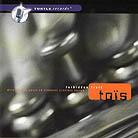June 1999
Toïs, a trio composed of Angelo Verploegen on trumpet and flugelhorn, Tjitze Vogel on double bass and Bram Wijland on drums, is joined on several tracks by guest Ed Verhoeff on guitar. Choosing material from Ellington (two cuts), Porter, Gershwin, Legrand and the Marsalis without emotional hang-ups (Branford), as well as three originals that sound very much like Miles Davis compositions, the group sets a high standard for themselves. To play music so well known and yet bring something new to the re-telling is a task reserved only for the talented. The good news is that they generally pull it off, and at times do even better than that. Take, "I Got It Bad and That Ain’t Good," for example, played as a trio. Verploegen has a Miles tone and feel, and the open space left by the trumpeter lets the bassist and drummer show their chops without showing off. We are left with, just as Miles left us with, the fragments of the tune necessary to fill the in emotional heartbeat, and nothing more. "Brad’s Feast," an original, adds Verhoeff’s guitar to great effect. A slow burner, the tune is familiar, but since the playing is so tight, so right, we can forgive that. In fact, throughout the disc each player consistently offers themselves in service of the song rather than using the situation as a personal showcase. If you are looking for knock-out solos, blistering runs or center-stage heroics, this is not the place. Instead, listen closely to "What is This Thing Called Love." The soft bass-and-drum opening leads to a gentle and oblique guitar statement followed by tasteful trumpet. The mood is sophisticated, romantic and elegant. Multiply that by nine, once for each track, and you have the album. As for the sound, it is reference quality, and one look at the liner notes explains why. Neil Patel of Avalon Acoustics lent both expertise and speakers to the mastering. The rest of the mastering chain, as you’d expect, was from Spectral and MIT. The 24-bit/96kHz recording was done using the Nagra D and with conversion happening with dCS equipment. The result is a very open and natural soundfield, even on the 16/44.1 standard-issue CD (I’ve not heard the 24/96 version). The feel is of live music happening in real space right in front of you. Dynamics are superb and tonality is as good -- top to bottom -- as I ever expect to hear from CD. This is a superb introduction to a swinging European combo to watch out for. Less overtly hot than current American playing but in the pocket nonetheless, these are players with something to say -- and recorded by a label to keep an eye on. GO BACK TO: |
 Toïs
- Forbidden Fruit
Toïs
- Forbidden Fruit![[Reviewed on CD]](../format/regcd.gif) Europe,
while a haven for US jazz players, with the exception of the odd bassist or horn player,
has yet to birth many world-class players. Actually, that may be a bit too narrow a
definition. European players, and I’m generalizing here so there are numerous
counter-examples, in broad terms are superb executioners that seem to lack originality.
Toïs, lovingly recorded by Netherlands-based Turtle Records, has set out to counter that
trend.
Europe,
while a haven for US jazz players, with the exception of the odd bassist or horn player,
has yet to birth many world-class players. Actually, that may be a bit too narrow a
definition. European players, and I’m generalizing here so there are numerous
counter-examples, in broad terms are superb executioners that seem to lack originality.
Toïs, lovingly recorded by Netherlands-based Turtle Records, has set out to counter that
trend.